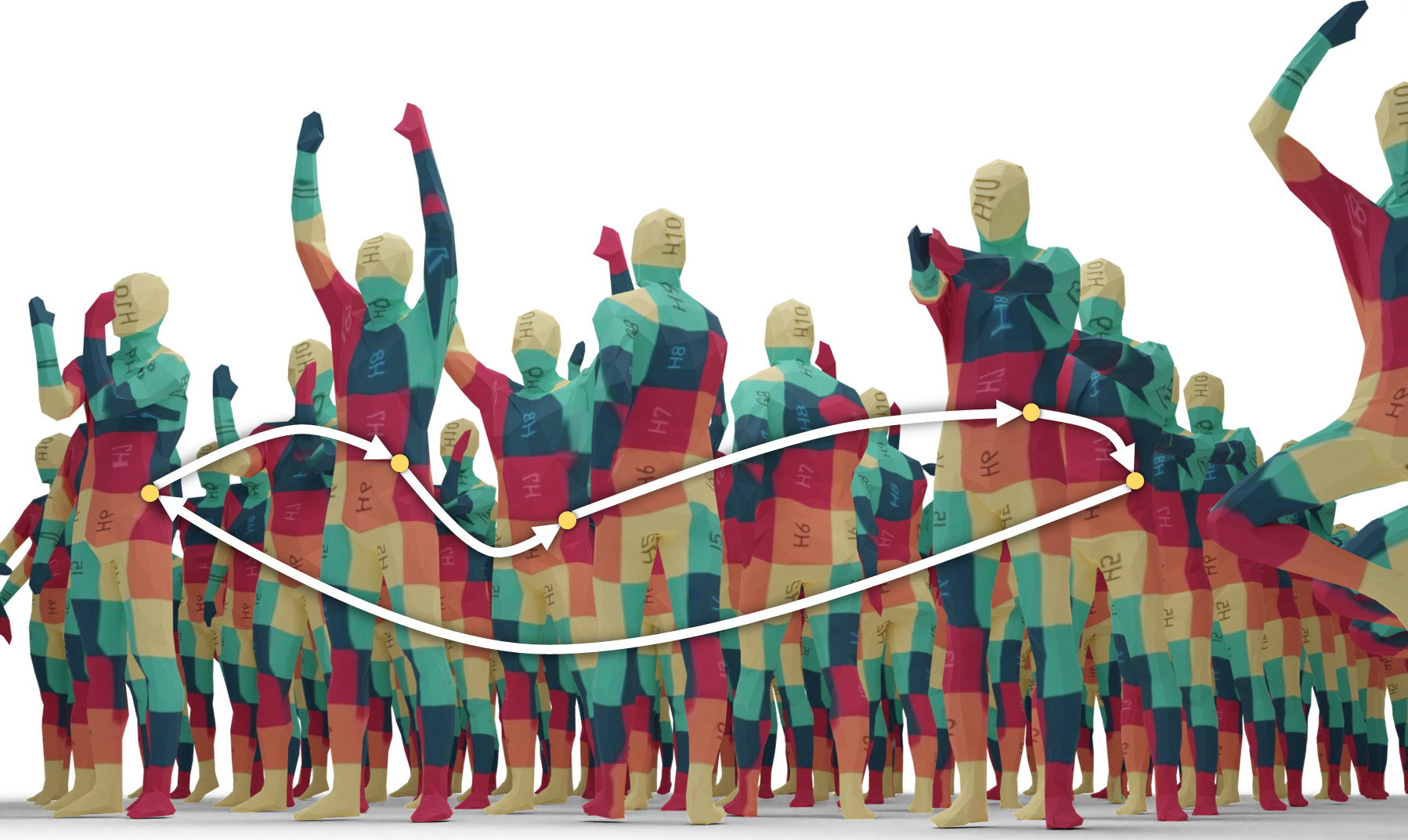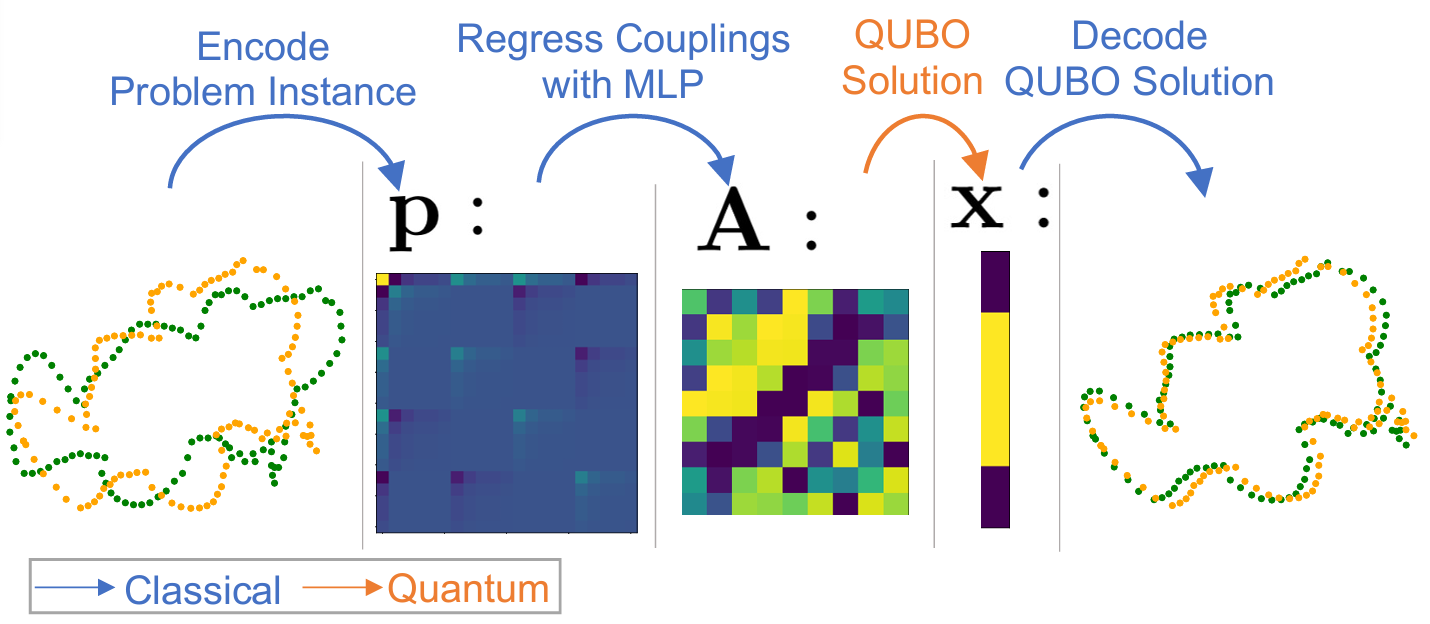Quantum Computer Vision and Machine Learning (QCVML)
Seminar – Winter Semester 23/24
Organiser: Dr. Vladislav Golyanik
Organisation | Content | Format | Resources
 |
 |
| CCuantuMM: Cycle-Consistent Quantum-Hybrid Matching of Multiple Shapes CVPR, 2023 |
QuAnt: Quantum Annealing with Learnt Couplings ICLR, 2023 |
Overview
Computer Vision strives to develop algorithms for understanding, interpreting and reconstructing information about real-world scenes from image and video data.
Machine Learning is concerned with studying and developing algorithms which use statistical models to solve problems by analyzing and drawing inference from data.
Quantum Computing focuses on leveraging quantum computational paradigms in algorithm development (e.g., in computer vision and machine learning).
Computer vision (CV) studies the automatic processing of visual and spatial information in the form of 2D images, depth maps, 3D point clouds, and different combinations of those (possibly along with other sensory signals). The long-term aim of computer vision is inspired by the capabilities of the human visual system (HVS) to come up with intelligent and high-level interpretations of the observed scenes. It manifests a tight intertwining between CV and machine learning (ML): While modern CV strongly relies on ML techniques, developments in ML are often driven by challenging CV problems.
A quantum computer (QC) is a computing machine which takes advantage of quantum effects such as quantum superposition, entanglement, tunnelling and contextuality to solve problems notoriously difficult (belonging to challenging complexity classes such as NP) for a classical computer. Thanks to the exponentially increasing investment in the technology, quantum computers are gradually moving from the realms of theory towards actual devices. Albeit restricted, experimental realisations of numerous quantum algorithms have demonstrated improved computational performance bringing the community closer to the desired supremacy in recent years.
The aforementioned premises of quantum computing and annealing has led to the popularisation of quantum computer vision (QCV), where researchers started to port existing computer vision problems into forms amenable to quantum computation. However, reframing the existing problems in the context of this new computing paradigm is not trivial. For instance, existing literature relaxes most of the (discrete) combinatorial search problems to continuous ones, whereas quantum annealing is great at optimisation on discrete binary variables. Hence, oftentimes we are required to revise the problem formulations at hand altogether. As one of the most massively data-producing disciplines, computer vision could become a particular profiteer from QC.
This seminar series will cover advanced research topics that cross the boundaries between the fields of Computer Vision, Machine Learning and Quantum Computing. Specifically, we will cover research papers on the following areas:
- Quantum-inspired methods
- Point set and mesh alignment
- Motion segmentation
- Robust model fitting
- Object tracking
- Neural network training
- Quantum-classical optimisation
- Quantum Machine Learning (QML)
- Quantum Convolutional Neural Networks (QCNNs)
- Recurrent Quantum Neural Networks (R-QNNs)
- Quantum Approximate Optimization Algorithm (QAOA)
Topics (Preliminary Selection)
The following table lists more topics than available weeks – this is to allow some flexibility for the interests of the group to change the course structure. Once every participant has submitted their choice of topics, this list will be updated to show the presenter of each topic. Send us an email if you cannot access a paper for some reason.
Click on each topic to show the papers to be discussed or show all papers.
| Topic and Papers | Presentation |
|---|---|
|
CVPR 2021
|
Presenter:
TBD
|
|
Presenter:
TBD
| |
|
Presenter:
TBD
| |
|
ECCV 2022
|
Presenter:
TBD
|
|
Presenter:
TBD
| |
|
CVPR 2023
|
Presenter:
TBD
|
|
Presenter:
TBD
| |
|
Presenter:
TBD
| |
|
Advanced Quantum Technologies 2019
|
Presenter:
TBD
|
|
Phys. Rev. X, 2020
|
Presenter:
TBD
|
|
Nature Physics, 2019
|
Presenter:
TBD
|
|
NeurIPS 2020
Quantum Science and Technology, 2022
|
Presenter:
TBD
|
